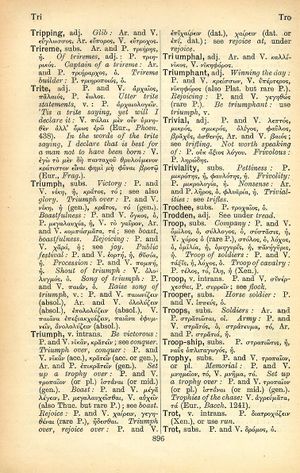trite: Difference between revisions
From LSJ
ὦ θάνατε παιάν, μή μ᾽ ἀτιμάσῃς μολεῖν· μόνος γὰρ εἶ σὺ τῶν ἀνηκέστων κακῶν ἰατρός, ἄλγος δ᾽ οὐδὲν ἅπτεται νεκροῦ. → O death, the healer, reject me not, but come! For thou alone art the mediciner of ills incurable, and no pain layeth hold on the dead.
m (Text replacement - "<b class="b2">Frag.</b>" to "''Frag.''") |
(6_16) |
||
| Line 9: | Line 9: | ||
<b class="b2">In the words of the trite saying, I declare that is best for a man not to have been born</b>: V. ἐγὼ τὸ μὲν δὴ [[πανταχοῦ]] θρυλούμενον κράτιστον εἶναι φημὶ μὴ φῦναι βροτῷ (Eur., ''Frag.''). | <b class="b2">In the words of the trite saying, I declare that is best for a man not to have been born</b>: V. ἐγὼ τὸ μὲν δὴ [[πανταχοῦ]] θρυλούμενον κράτιστον εἶναι φημὶ μὴ φῦναι βροτῷ (Eur., ''Frag.''). | ||
}} | |||
{{Lewis | |||
|lshtext=<b>trĭtē</b>: ēs, f., = τρίτη; in [[music]],<br /><b>I</b> the [[third]] [[string]] or [[tone]] in the [[musical]] [[scale]], Vitr. 5, 4. | |||
}} | }} | ||
Revision as of 09:08, 13 August 2017
English > Greek (Woodhouse)
adj.
P. and V. ἀρχαῖος, παλαιός, P. ἕωλος.
Utter trite statements, v.: P. ἀρχαιολογεῖν.
'Tis a trite saying, yet will I declare it: V. πάλαι μὲν οὖν ὑμνηθὲν ἀλλʼ ὅμως ἐρῶ (Eur., Phoen. 438).
In the words of the trite saying, I declare that is best for a man not to have been born: V. ἐγὼ τὸ μὲν δὴ πανταχοῦ θρυλούμενον κράτιστον εἶναι φημὶ μὴ φῦναι βροτῷ (Eur., Frag.).
Latin > English (Lewis & Short)
trĭtē: ēs, f., = τρίτη; in music,
I the third string or tone in the musical scale, Vitr. 5, 4.

